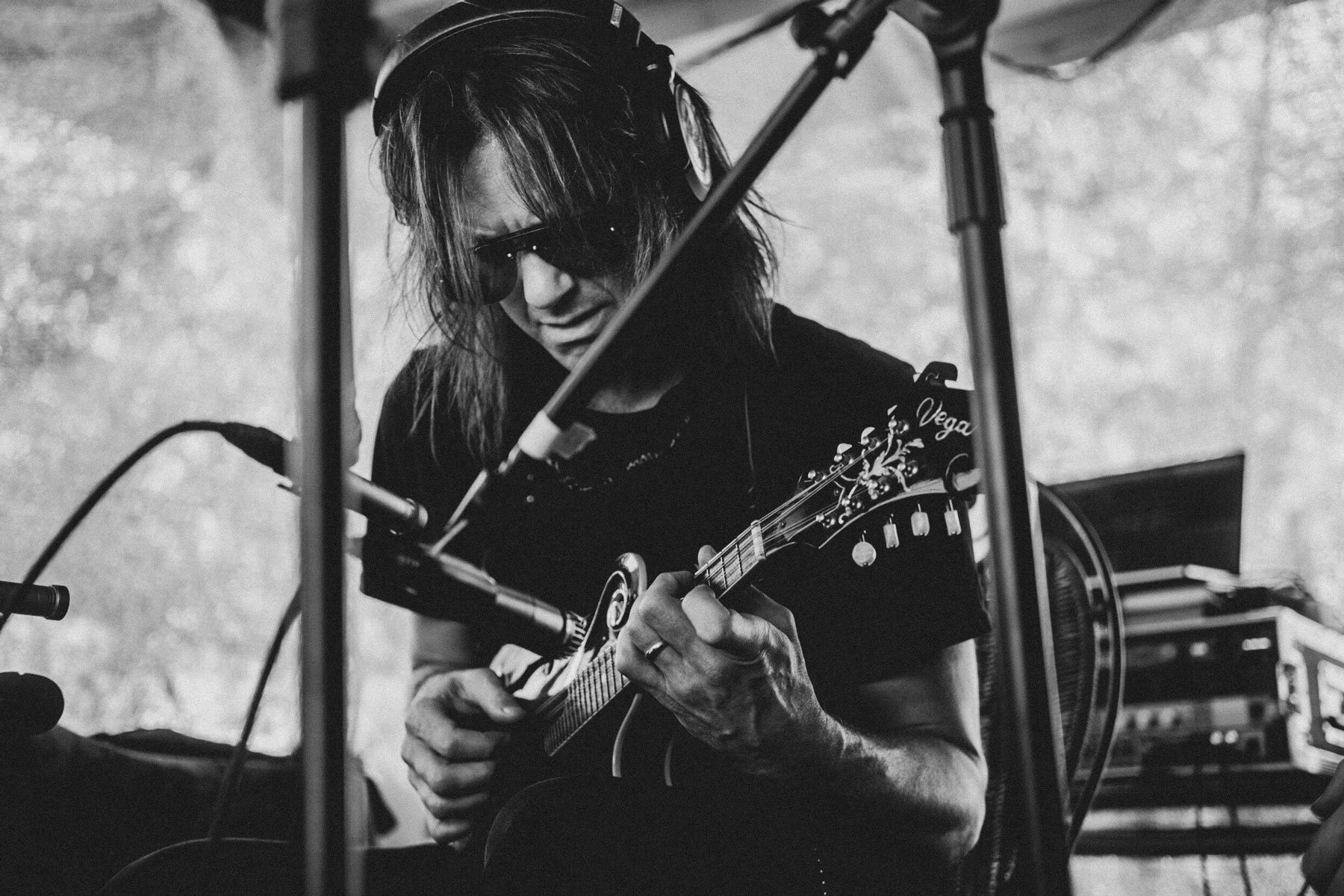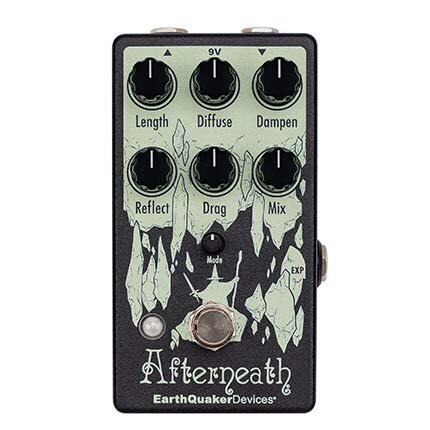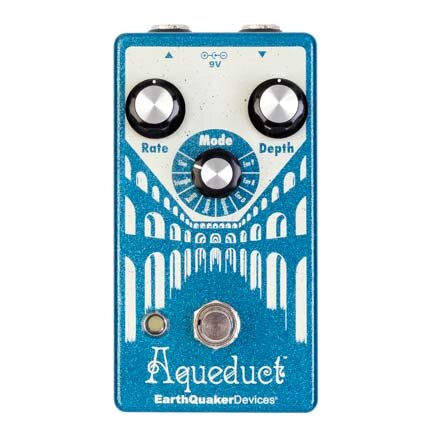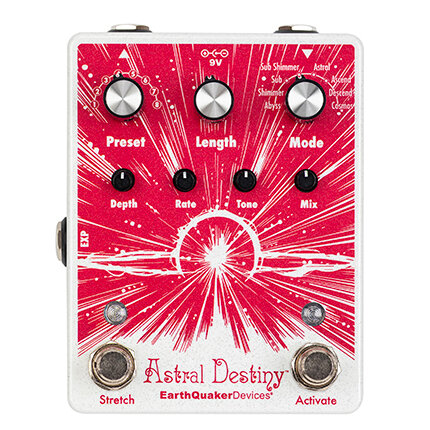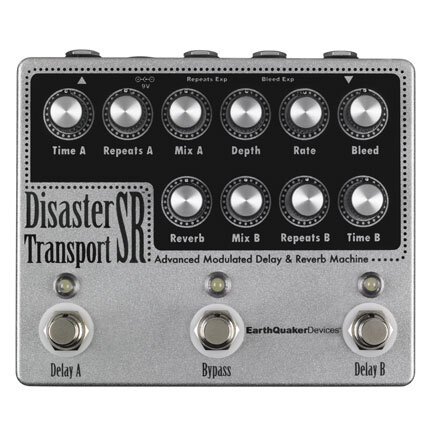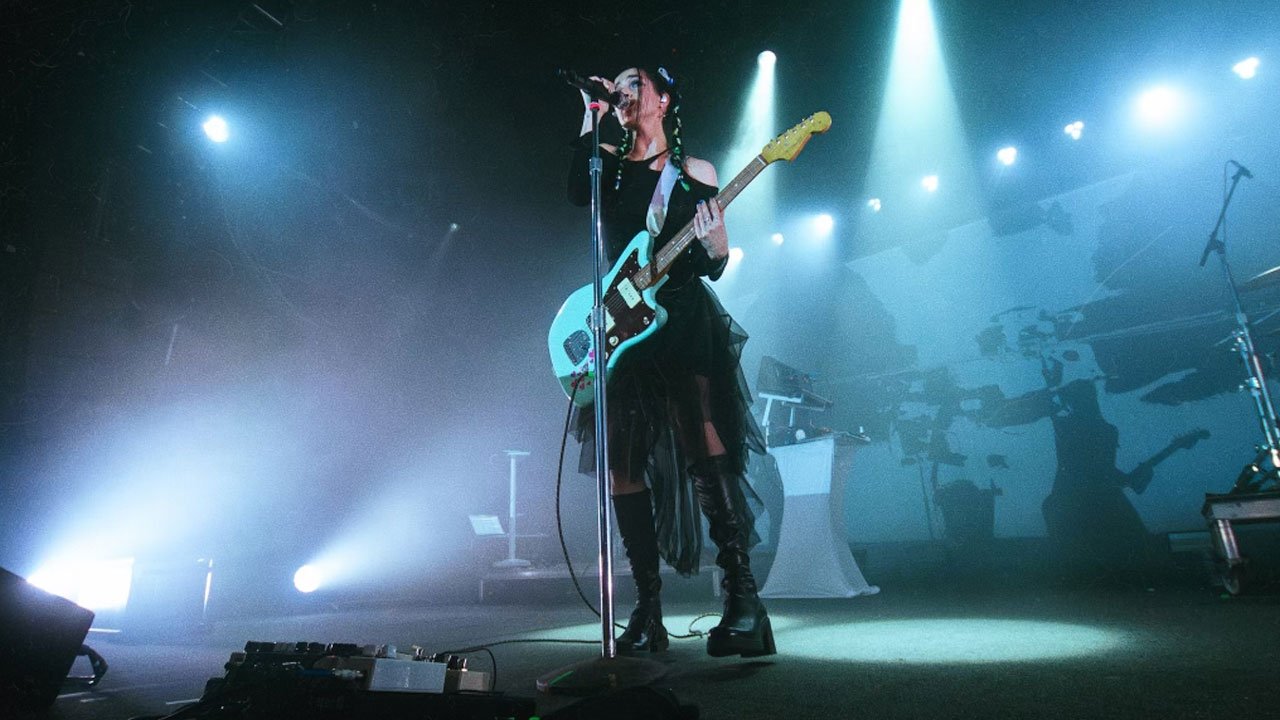Robin Finck: Nails, Guns & Games
Malcolm X Abram
Not too many musicians get the opportunity to record and tour with a hit-making arena and stadium rocking band. But guitarist Robin Finck has played in not just one, but two huge arena and stadium-filling bands.
Finck has also played in bar bands and for a time literally lived and worked in a nightclub back in his early days as a young musician in the 90s Atlanta club scene. He watched, listened and learned as touring bands with and without awesome gear took the stage night after night. In 1994, he joined up with an intense singer-songwriter-keyboardist named Trent Reznor and his up-and-coming arena-ready industrial rock band Nine Inch Nails. Finck stayed with NIN for a few years before widening his resume with a stint with Cirque Du Soleil and then spent a couple of years with another band you may have heard of, Guns N’ Roses, and even appeared on the long-delayed album Chinese Democracy. Finck eventually returned to the NIN fold in 2008 where he has remained and was inducted into the Rock and Roll Hall of Fame with the band in 2020. He has also appeared on albums by singer/rapper Cee-Lo Green, New Wave icon Gary Numan and did some soundtrack work for horror film director and composer John Carpenter.
More recently, Finck was prepared to spend the fall and some of the winter months on the road with Nine Inch Nails. But the continued proliferation of the pandemic prematurely ended those plans. Conveniently, Finck has embarked on a new professional challenge to help spend his “extra” time off the road. Finck and veteran game designer Cory Davis recently founded EYES OUT, a Los Angeles-based arthouse game development studio.
Finck graciously conducted an email interview with EQD talking about his new and old gear and the challenge of creating music for the always-evolving gaming world.
EQD: So sorry to hear about the cancellation of NIN's Fall '21 tour. How difficult is it to get your mind, body, and gear ready for a tour and then have to suddenly and completely rethink the next few months of your life?
Robin Finck: I was, of course, looking hard at getting out and getting to play. It's been too long already, and I felt like this was going to finally happen, us getting out there. I'd been prepping the songs on my own for a bit, was at the rehearsal room for a couple of days, Rob Zombie band thumping through the walls, cases splayed about. I was stepping through the touring rig, reacquainting myself with RJM abbreviations. Callouses. It was starting to feel real.
EQD: You've been with NIN since 1994, give or take a break. I'd guess that the needs of performing the music and the scope of NIN shows have changed quite a bit in 20+ years. How much has your touring rig grown and/or morphed? And please talk about your current rig and your pedalboard.
RF: I feel like I'm re-approaching the gear anew each time. Sometimes because it's actually new advanced gear since last go-'round, and sometimes because it has just been a few years since I'd looked at the stuff. I try to keep it slim and streamlined. I can think of a few people who are shaking their heads right now. But there are dozens upon dozens of unique tones, some that are used for one song only, sometimes one part only. They just add up. I try to keep the audience in mind, and Jamie at FOH in mind when creating these patches and matching this with that. Are the people on the lawn, or the people in the front row going to know about, care about, or even hear the difference between this tweak and that subtle change from a similar preset I made for that other song? Or what if the POG jumps out the window; are we sunk? But then…I'm hearing it right up close, direct into my brainstem, so maybe I'm tweaking for me. I dunno.
But yeah, the stuff has changed in 20 years. It got bigger. And then it got smaller. When I started with NIN, that was the first time I was piecing and driving any rack and midi gear. Complete with the Cylon Raider tuner at the top, like I'd only seen from those out-of-town bands that came through the Masquerade.
I added and omitted and started over through the years. One NIN cycle, 2008-ish, I played through a Marshall JCM2000 and pedals only. No midi. That was mostly great. Some sounds were a compromise, but the give and take were justifiable.
This year I was poised to head out with Axe-Fx and a couple of drawers of pedals, RJM switching system, and Matrix power amp and FR cabs. Also, a mic-ed Orange Rockerverb to be blended with the most prominent heavy sound. I built a pedalboard to perform with Danny Elfman at Coachella, which fell to COVID. But the board I used in rehearsal for a bit, and eventually on Danny's record, Big Mess, went into an Orange Rockerverb 100 for the stage and an Orange Rocker 32 in the studio. It's this cool board from Barcelona called Aclam. It's got rubber bumpers with turn-screws to fasten the pedals. The EQD Disaster Transport SR and Aqueduct are on there and see a lot of action, with some faves from Death By Audio, EHX, Voodoo Lab, BOSS (because of course), Keeley, and the Chase Tone Secret Preamp at the end.
I also brought a second board that was meant to go direct to the console. Sometimes in tandem. The big player on there is the RML Electron Fuzz. It's one of the great DI distortion boxes. As is the DBA Micro Harmonic Transformer. We also were using the Two-notes WOSlll cab sims on some of that stuff.
EQD: You have a few EQD reverbs and delays (Astral Destiny, Afterneath, Disaster Transport SR). Those pedals can all get pretty far out; how do you like to use them? Also, what do you do with the Data Corrupter?
RF: What I love about the Disaster Transport SR, is that I'm forced to throw my hand, and it usually doesn't take long to end up somewhere new and good. There's just enough trouble exposed, and it's just fun to roll around in.
The Data Corrupter I've used mostly in line with mono synth or sequencer. Oh, and with my Drone King, by Electro-Faustus. The Data Corrupter really expands these chains and can be a catch-net for happy accidents. So, keep it rolling.
EQD: Guitar is considered your main instrument; what other instruments do you like to hook up to pedals?
RF: You know, anything that blips and grunts. Drone machines like Strega, or Lyra-8 or White Fly, or those little Korg boxes, or DFAM. Also, it's fun to get a mic going to a looper and a mess of pedals. Then it's really just the whole world you're sittin' on.
EQD: Do you consider yourself a gear "collector" or "experimenter?" When it comes to pedals, specifically, do you try to match a pedal with the sounds already in your head, or do you ever experiment with pedals for inspiration? i.e., do you buy what you need as you think you'll need it or pick up pedals, etc., that just seem interesting or inspiring?
RF: Well, I dunno. I'm into pedals like my feet are into shoes. It's just sort of inevitable in this lifetime. I could go without for a spell, but I wouldn't get far before I'm all crying and bleeding. I'm most definitely not a collector. I'm more interested in what they sound like today. I'm also not into pedals that don't work sometimes. I'd rather just be playing with a version of something that always works.
I think I'm more experimental with pedals when chaining them after a synth or sequencer because they are usually on a table, and I have two hands free, and the loop is happening. And with a guitar chain, yea, I guess I sorta usually know what I'm aiming for. There are outliers but...maybe I should shake that up, huh?
EQD: What was attractive to you about game composing back in 2014 when you got into it? Does composing for games afford opportunities for you to tap into some new and different aspects of music-making or sound design that perhaps your other projects don't provide?
RF: The most attractive part of game development is the developers. I continue to meet unique, inspired, capable individuals with ambitious ideas and all the sexy tech to make it go. It's really an inspiring community.
I love the immersion, the spelunking into story. The batting of ideas. The place where all the design elements of art and architecture, character, fashion, environmental storytelling, and of course the nuanced affair of sound design and music. All of this and so much more is literally at play, and the audience is given agency over where to go, what to choose, how long to hang. It is so very detail oriented. A tweaker's utopia.
It's a vast field of infinite potential. It is enormously challenging.
EQD: Game music is a growing market for composers. Can you talk a bit about the different approaches you take when composing for a band/solo vs. composing for a band/interactive experience?
RF: The emotive opportunity to adhere music with an immersive scene, one that the player is engaged in and has control over, is a nuanced affair. The part where it is so very different from any other medium is the part where the whole experience is reactive and so unpredictable. And this gives rise to enumerable issues.
One issue is the issue of duration. When pacing a level, or even a scene within a level, the experience could last any disparate number of seconds or even many minutes. So, to build tracks with vertical layers of potential for expansion or reduction and have them seamlessly move into the next 'beat' of the play experience can be a challenge. We're also playing with the quantization of stems within an interactive experience. And to create reactive and emotive music that plays well as a non-diegetic score, outside of whatever diegetic sound in the inspectable and interactive world that is necessary, is a thing. There may be triggers hooked to any number of timed events, or look-at events, or static localized events. They all need to play with one another, as well as not fire overtop V(oice) O(ver) lines as they are delivered, or flam with UI sounds. I mean, I guess this answer has devolved to techno dribble.
The short of it is, we're writing for a non-linear environment, as opposed to a linear left to right, beginning to end, environment. Of course, there can be locked cinematic moments and different exposes of finite vignette sorta stuff. But ultimately, there are many hours of interlocking moments heralded by the player, and each trek through the levels will be somewhat unique. Playing with those moments of compression and release is the stuff that really makes it feel alive. It's a real place.
EQD: Any other projects you're looking forward to working on or starting while waiting for the NIN '22 touring to resume?
The project we have at EYES OUT is a big engagement. I'm focused on that now and looking forward to sharing more about it as we're able to let on.
I'm also eagerly anticipating the return of the world and Nine Inch Nails' place in it.
Malcolm X Abram is a recovering reporter and music writer and a proud 40 year guitar noodler. He lives, works and plays in the bucolic dreamland of Akron, Ohio in an old house with two dogs who don’t really like each other and way too many spiders.

